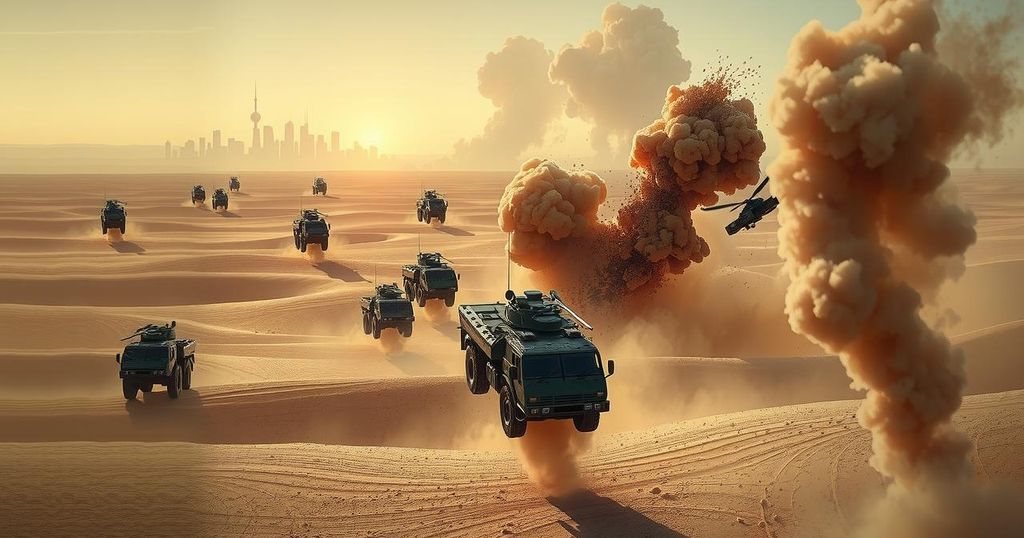Sudan Civil War: Army Gains Ground in Effort to Reclaim Khartoum

The Sudanese army has made significant territorial gains in Khartoum, recapturing areas from the RSF amid ongoing violence. Despite these advances, the humanitarian crisis remains severe, with millions displaced and widespread starvation. Concerns mount among civilians about the repercussions of the conflict, leaving many anxious about their safety as the army approaches.
The situation in Sudan remains dire as the army has reportedly made significant advances in Khartoum, reclaiming substantial areas from the Rapid Support Forces (RSF) paramilitaries. The recent military developments are described by residents and a doctor, referred to as Mustafa, who stated, “Shrapnel and stray ammunition are falling on my neighbourhood. The clashes these days are heavy.” Key landmarks such as the mint have returned under army control this week, reflecting their largest victory in the conflict’s duration.
Despite these gains, the RSF still controls the majority of the capital city. However, the army’s effective recapture of vital territories including the state of Gezira has instilled confidence in their ability to finally regain control of the capital and end the RSF’s prolonged siege. “Very soon there will be no rebels in Khartoum,” proclaimed army leader Gen Abdel Fattah al-Burhan recently.
The humanitarian situation in Sudan continues to deteriorate, exacerbated by the ongoing conflict, with over 100,000 individuals suffering from famine in Khartoum alone. Researchers, supported by the United Nations, reveal that 12 million people have been displaced and many civilians have died as a result of the hostilities between Gen Burhan and his former deputy, Mohamed Hamdan “Hemedti” Dagalo, leading the RSF.
International aid agencies categorize Sudan’s situation as the worst humanitarian crisis globally, attributing severe atrocities committed against civilians to both the army and the RSF, while both factions deny the allegations. Many inhabitants have reportedly celebrated the army’s successes, contrasting their treatment under RSF forces, who are accused of widespread violence including murder and sexual assault.
The RSF has dismissed reports of army advances as “lies and rumours,” mirroring their stance during previous retreats. Analysts attribute the army’s recent successes to an increase in personnel and armament. Their reclaiming of the army headquarters has notably bolstered their efforts this month, despite the specter of violence that follows such military victories.
Worries abound regarding the treatment of individuals perceived to have collaborated with the RSF, as illustrated by residents like Mustafa, who expressed fears about the potential repercussions for innocents caught in the conflict. Amir, a resident of Omdurman, voiced concerns for his cousin, illustrating the thin line between survival and perceived collaboration in this war-torn environment. As the army progresses, the conclusion of this conflict remains uncertain, leaving ordinary citizens in anxious anticipation.
In conclusion, the Sudanese civil war intensifies as the army makes crucial territorial gains against the RSF, reclaiming significant areas of Khartoum. Despite the army’s advances, the humanitarian crisis worsens, with millions displaced and thousands suffering from famine. Many civilians face increased danger amidst the conflict, heightening fears of retribution based on perceived collaboration. The unfolding situation continues to be precarious as residents await a resolution to the ongoing violence.
Original Source: www.bbc.com








